Can’t Bury the Truth, Authors Say in Response
Updated April 7
Homepage photo credit: Black Enterprise
[btnsx id=”5768″]
Donations are tax-deductible

Chinara Tate, at right, accepts the posthumous Pulitzer Prize Special Citation for her father, Greg Tate, last year from Columbia University Interim President Katrina Armstrong. (Credit: David Dini/Pulitzer Prizes)
Can’t Bury the Truth, Authors Say in Response
Such prominent Black journalists and commentators as Juan Williams, Wil Haygood, Michael Eric Dyson, Bakari Sellers, Eddie Glaude, Wesley Lowery and the late Greg Tate are among the authors on a list released by the U.S. Naval Academy of 381 books and literary works removed from its library as part of a review of diversity, equity and inclusion materials.
Those on the list contacted by Journal-isms Saturday night could be scathing in their disapproval.
 “To ban or remove books is a vicious betrayal of the American creed of freedom of thought and expression,” messaged Dyson (pictured), now centennial chair and university distinguished professor of African American and diaspora studies at Vanderbilt University.
“To ban or remove books is a vicious betrayal of the American creed of freedom of thought and expression,” messaged Dyson (pictured), now centennial chair and university distinguished professor of African American and diaspora studies at Vanderbilt University.
“Fascism has many faces, and one of its ugliest is the quarantine of knowledge and literacy according to biased principles and rigid perspectives. In the effort to fight off prejudice, they have reinforced it with startling disregard for the best American values and traditions.”
Dyson has two books on the list, “Long Time Coming: Reckoning with Race in America” at No. 4, and “Tears We Cannot Stop: A Sermon to White America” at No. 112.
‘ ” ‘Ignorance is strength,’ George Orwell wrote in 1984,” messaged Ian Haney López (pictured), a law professor at the University of California, Berkeley, who specializes in race and racism. “Now Orwell’s satirical propaganda slogan has become the Trump Administration’s policy position.”
” ‘Ignorance is strength,’ George Orwell wrote in 1984,” messaged Ian Haney López (pictured), a law professor at the University of California, Berkeley, who specializes in race and racism. “Now Orwell’s satirical propaganda slogan has become the Trump Administration’s policy position.”
Lopez, who is mixed Latino and white — and grew up in Hawaii, has two books on the list, “Merge Left: Fusing Race and Class, Winning Elections, and Saving America” at No. 73, and “Dog Whistle Politics: How Coded Racial Appeals Have Reinvented Racism & Wrecked the Middle Class,” at No.119.
 Williams (pictured), a commentator on Fox News cited for his 2006 book “Enough: The Phony Leaders, Dead-End Movements, and the Culture of Failure That Are Undermining Black America: And What We Can Do About It,” messaged Journal-isms Saturday night, “You can’t ban the truth. You can’t ban reality. Smart people will find their way to what is true and real and shame those selling ignorance.” His book was No. 130 on the Naval Academy’s removal list.
Williams (pictured), a commentator on Fox News cited for his 2006 book “Enough: The Phony Leaders, Dead-End Movements, and the Culture of Failure That Are Undermining Black America: And What We Can Do About It,” messaged Journal-isms Saturday night, “You can’t ban the truth. You can’t ban reality. Smart people will find their way to what is true and real and shame those selling ignorance.” His book was No. 130 on the Naval Academy’s removal list.
WBAL-TV in Baltimore reports on removal of books from the Naval Academy Library. (Credit: WBAL/YouTube)
Haygood, a former reporter at the Washington Post and Boston Globe, was represented at No. 296 for his 2021 book “Colorization: One Hundred Years of Black Films in a White World.”
“I am very proud of COLORIZATION, a book that tells the truth about the history of film and race in America. Those in power who try to bury the truth will not win,” he messaged.
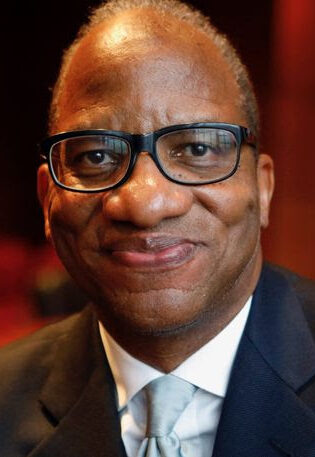 Haygood (pictured) added that “Friends have been emailing me across the world even.” Amazon noted that “Colorization” was a New York Times Critics’ top book of the year, Booklists’ editor’s choice and one of NPR’s best books of the year.
Haygood (pictured) added that “Friends have been emailing me across the world even.” Amazon noted that “Colorization” was a New York Times Critics’ top book of the year, Booklists’ editor’s choice and one of NPR’s best books of the year.
The academy’s removals took place just as the American Library Assocation’s National Library Week was about to begin.
The library association declared in February, “These shameful censorship decrees erase history and silence the voices of Americans whose lives reflect the diversity of our nation. The brave people who defend us deserve to exercise the rights they protect, and their children deserve the right to read a broad array of materials and learn from a range of perspectives that reflect the abundance of ideas from all Americans. Military personnel, with input from school librarians and teachers who serve them, should be trusted to select the resources that meet their families’ information needs.”
The Naval Academy’s action follows directives from Defense Secretary Pete Hegseth’s office to evaluate and eliminate works focused on DEI.
“Some titles include ‘How to Be an Antiracist’ by Ibram X. Kendi, ‘White Evangelical Racism: The Politics of Morality in America’ by Anthea Butler, ‘Writing/teaching: Essays Toward a Rhetoric of Pedagogy’ by Paul Kameen, and ‘I Know Why the Caged Bird Sings’ by Literarian Award recipient Maya Angelou,” Todd Karpovich reported for the Baltimore Sun.
“Other titles included themes of feminism, civil rights and racism, along with books surrounding Jewish history, including ‘Memorializing the Holocaust: Gender, Genocide and Collective Memory’ by Janet Jacobs.“
John Ismay added for The New York Times, “The inclusion of Maya Angelou’s best-selling 1970 memoir was notable because it has long been viewed by Black women, and men, as transformative. The book, which spent two years on the New York Times best-seller list and was nominated for a National Book Award, chronicles her struggle with racism and trauma, including her account of a rape at the age of 7 by her mother’s boyfriend.
“Oprah Winfrey famously said that she had been moved to learn from the book that another Black girl had endured sexual abuse. ‘I read those words and thought, “Somebody knows who I am,’’ she said.
“The Naval Academy began pulling books from the shelves at Nimitz Library on Monday evening and largely completed the task before Mr. Hegseth visited midshipmen on campus Tuesday afternoon.”
[On Monday, Cmdr. Tim Hawkins, a Navy spokesperson, told Journal-isms, “The books removed are currently unavailable to Midshipmen and faculty for checkout. . . . the identified books were placed in a room where library patrons cannot access them.”
[He also said, “Department of the Navy leadership determined the books listed required removal in order to ensure full compliance with directives outlined in Executive Orders issued by the President.”]
Two of the Black journalists on the list have died and another is incarcerated.
Cultural critic Tate died in 2021. His “Everything But the Burden: What White People Are Taking from Black Culture” was No. 113 on the Naval Academy’s list.
Last year, the Pulitzer Prize board awarded Tate a rare posthumous special citation, saying his “language – cribbed from literature, academia, popular culture and hip-hop – was as influential as the content of his ideas. His aesthetic, innovations and intellectual originality, particularly in his pioneering hip-hop criticism, continue to influence subsequent generations, especially writers and critics of color.”
 Leon E. Wynter (pictured), a commentator or reporter for the Wall Street Journal, NPR and the Washington Post, died in 2011. His “American Skin: Pop Culture, Big Business, and the End of White America,” No. 94 on the list, “joins a chorus chronicling the dissolution of America’s once-clear racial delineations into a’ ‘transracial’ culture,” said Publishers Weekly. It was written “with vivid, witty prose.”
Leon E. Wynter (pictured), a commentator or reporter for the Wall Street Journal, NPR and the Washington Post, died in 2011. His “American Skin: Pop Culture, Big Business, and the End of White America,” No. 94 on the list, “joins a chorus chronicling the dissolution of America’s once-clear racial delineations into a’ ‘transracial’ culture,” said Publishers Weekly. It was written “with vivid, witty prose.”
The publication also said, “The downside of ‘transracialism’ is ‘the steady erosion of black identity as the organizing principle for community development,’ but Wynter concludes that ‘the future is not about black people leading black people [but] about black people leading all Americans, especially black Americans’ through popular culture and the commercial marketplace, which, for better or worse, he sees as the motor of race relations.”
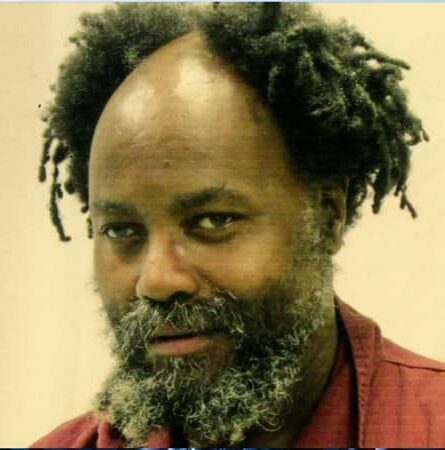 The incarcerated Mumia Abu-Jamal (pictured) is at No. 141 with 2017’s “Have Black Lives Ever Mattered?”
The incarcerated Mumia Abu-Jamal (pictured) is at No. 141 with 2017’s “Have Black Lives Ever Mattered?”
As Essence has noted, Abu-Jamal is a former radio journalist who was convicted of fatally shooting white police officer Daniel Faulkner in 1981 and was sentenced to death in 1982, a penalty since reduced to life in prison. “Through the years, which he spent at a Pennsylvania prison, Mumia became a household name thanks to his radio broadcasts, books and celebrity supporters, including hip hop luminaries like Chuck D, Tupac, and Snoop Dogg.”
Other journalists whose books were removed include Lowery, who has been called a “star journalist” and was a member of the team awarded the 2016 Pulitzer Prize for National Reporting for the Washington Post’s coverage of police shootings. Lowery is on the Naval Academy’s list at No. 145 for “They Can’t Kill Us All: Ferguson, Baltimore, and a New Era in America’s Racial Justice Movement.”
Issac J. Bailey, a former columnist at the Sun-News in Myrtle Beach, S.C, is at No. 3 for “Why Didn’t We Riot?: A Black Man in Trumpland.” Bailey is now a professor of practice at Davidson College in its Communication Studies Department.
His books include “Proud. Black. Southern. (But I Still Don’t Eat Watermelon in Front of White People)” from 2008.
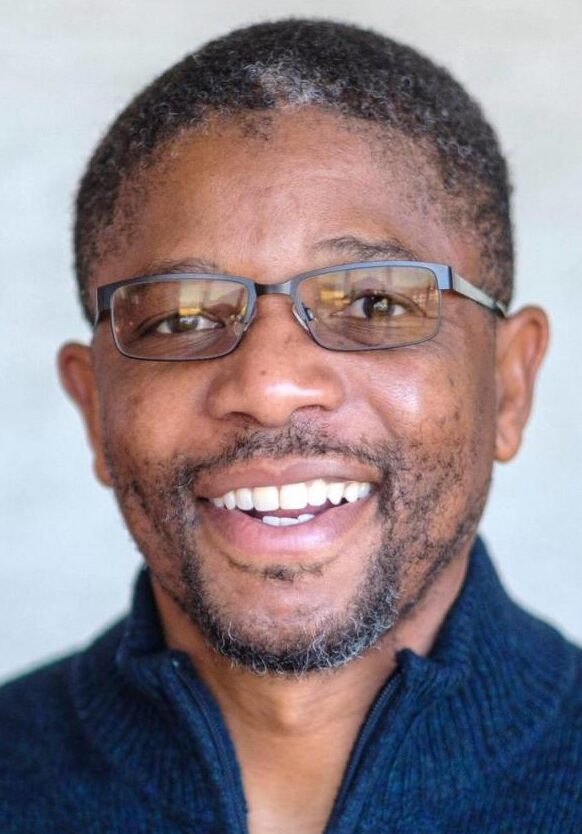 Bailey (pictured) messaged, “This is just the latest evidence that we are in the Lost Cause 2.0. During the first, the South was able to whitewash history and distort how an entire region understood itself, a reality that has had huge implications for generations of young people. We must not let the Trump administration and others of like mind do the same for the entire country.
Bailey (pictured) messaged, “This is just the latest evidence that we are in the Lost Cause 2.0. During the first, the South was able to whitewash history and distort how an entire region understood itself, a reality that has had huge implications for generations of young people. We must not let the Trump administration and others of like mind do the same for the entire country.
“What’s ironic about that book being banned is that I struggled mightily to find a way to be somewhat positive despite what we were facing. I wrote [it] during the aftermath of the George Floyd killing and desperately wanted to believe things really were going to change, that there really would be a racial reckoning that would lead to a racial awakening. This banning proves that wasn’t the case, unfortunately.”
No. 129 on the list is “When Race Becomes Real: Black and White Writers Confront Their Personal Histories,” a 2002 book of essays edited by Bernestine Singley with an epilogue by the late scholar Derrick Bell. Included are Black journalists and commentators Leonard Pitts Jr., Julianne Malveaux, Les Payne, Ira J. Hadnot, Touré and Carlton Winfrey. Singley describes herself as a lawyer, facilitator, author and activist.
Commentators and thought leaders whose books were removed also include Stacy Abrams, James Loewen, Gerald Horne, Carol Swain, Tim Wise, Carol Anderson, Randall Kennedy, Andrew Hacker, Imani Perry, Houston Baker and the Rev. Bryan Massingale, a Black Catholic priest whose “Racial Justice and the Catholic Church” is the subject of this video.
 “It is unconstitutional and tragic that ‘Stamped from the Beginning’ and ‘How to Be an Antiracist’ were removed from the library,” messaged Kendi (pictured). “If we had a federal government committed to racial equality, then the Naval Academy would be adding antiracist books to the shelves, not removing them.”
“It is unconstitutional and tragic that ‘Stamped from the Beginning’ and ‘How to Be an Antiracist’ were removed from the library,” messaged Kendi (pictured). “If we had a federal government committed to racial equality, then the Naval Academy would be adding antiracist books to the shelves, not removing them.”
- List of books removed [PDF]
- Donna Brazile, The Hill: Trump is whitewashing US history and embracing ‘alternative facts’
- Leslie M. Harris, Boston Globe: For Black people, the Revolution was full of paradoxes: Some fought for the British. Others went to war for the colonists, who compared their own plight to enslavement even as they perpetuated it.
- Robert P. Jones, Substack/Religion News Service: My book was just banned from the US Naval Academy library (April 7)
- Michael Elsen-Rooney, Chalkbeat New York: Trump gave states 10 days to sign an anti-DEI policy. NY Education Department is refusing.
- William Kristol, Andrew Egger, and Jim Swift, The Bulwark: In a World of Pete Hegseths, Be a Maya Angelou (April 8)
- Jon Swaine and Jeremy B. Merrill, Washington Post: Amid anti-DEI push, National Park Service rewrites history of Underground Railroad
Eugene Robinson Resigns From Washington Post
April 3, 2025, updated April 4, 5
Pulitzer Winner Cites ‘Significant Shift’ at Paper
Despite Cuts, Philly Inquirer Still Commits to DEI
Press Groups Blast Arrest of Student Over Op-Ed
Black Press Sees Harm in Tariffs on Newsprint
He Wants to Make Sports Journalism ‘Fun Again’
Short Takes: “DEI” book removals at Naval Academy; threat to withhold funds from public schools; revamped “CBS Evening News”; Elise Jordan, Antonia Hylton and MSNBC; Jesús Del Toro, Sonny Messiah Jiles and Angela Y. Robinson; Jube Shiver Jr.; ESPN’s “Around the Horn”; Becky Livas, Barbara Ciara and Barbara Hamm; Candace Buckner; Brian Bull; anti-racist “Best Practices” in Brazil; mass destruction of media buildings in Sudan; lack of journalist safety in Ethiopia; journalists conscripted into Burkina Faso army.
[btnsx id=”5768″]
Donations are tax-deductible
On MSNBC, Eugene Robinson discusses the flurry of executive orders that came on Trump’s first day in office, starting at 2:00. (Credit: YouTube/MSNBC)
Pulitzer Winner Cites ‘Significant Shift’ at Paper
Eugene Robinson, Pulitzer Prize winning columnist at The Washington Post, announced Thursday that he is leaving the paper because a “ ‘significant shift’ in the mission of our section spurred me to decide that this is the time for my next chapter,” as Robinson relayed to Journal-isms.
The announcement was greeted with regret and praise for Robinson on social media and elsewhere. Fellow Post columnist Colbert I. King, a former deputy editorial page editor, called it “devastating news. A brilliant, irreplaceable voice. A cherished comradeship. Unbroken.”
However, the Post spun the news into a “retirement” and offered congratulations.
““Our sincerest congratulations to beloved Washington Post columnist Eugene Robinson on his retirement,” a statement said. “For 45 years, his reporting and commentary spanned continents and beats, earning countless recognitions, including a Pulitzer Prize. Eugene’s strong perspective and impeccable integrity have regularly shaped our public discourse, cementing his legacy as a leading voice in American journalism.”
The veteran columnist’s decision follows by just three weeks a similar decision by fellow columnist Ruth Marcus, who wrote for The New Yorker, “I am taking this step, after more than 40 years at The Post, following Will’s decision to spike a column that I wrote expressing concern about the newly announced direction for the section and declined to discuss the decision with me,” referring to Publisher Will Lewis.
Benjamin Mullin wrote then for The New York Times, “Ms. Marcus is the most prominent writer to leave The Post’s opinion section since Jeff Bezos, the founder of Amazon who owns the paper, changed its focus to ‘personal liberties and free markets.’ David Shipley, the section’s editor, resigned as a result of that decision.”
In a 5,133-word piece in the New Yorker last month on her own decision to leave, Marcus mentioned Robinson as one who wrote “a subtle column on the new documentary about Katharine Graham,” the prominent Washington Post publisher. “The column made no reference to Bezos, but its paeans to Graham’s courage in the face of Richard Nixon’s threats evoked an implicit comparison with the current owner and his relationship with Trump.
Readers got it, too. An AI-generated summary of the hundreds of responses to the column said, “The comments overwhelmingly praise Katharine Graham for her courage, integrity, and commitment to journalistic principles, particularly in her decision to publish the Pentagon Papers and pursue the Watergate story. Many commenters contrast her bravery with what they perceive as Jeff Bezos’s lack of courage and integrity in his ownership of The Washington Post. They express nostalgia for Graham’s era, lamenting the current state of the paper under Bezos, whom they criticize for prioritizing business interests over journalistic integrity.”
Robinson was influential enough for President Trump to call for him to be “fired immediately” after Robinson heavily criticized Trump and Elon Musk.
In a column headlined, “These Republicans Should Be Ashamed of Themselves,” Robinson said Trump “tramples” on the Constitution and is making “unacceptable choices” for his administration, but congressional Republicans are too scared to push back.
“The longtime WaPo writer and editor then ripped Musk — whom he called ‘Trump’s moneybags enforcer’ — for his push to cut trillions of dollars in government spending,” the Daily Beast wrote.
Here’s his email: pic.twitter.com/EqnorGvsFN
— Ben Mullin (@BenMullin) April 3, 2025
If no image appears, please consider using another browser.
In his most recent column, posted March 31, Robinson began, “With an angry executive order that targets the Smithsonian Institution — specifically taking aim at the National Museum of African American History and Culture — President Donald Trump is brazenly trying to obscure and whitewash the past. He will fail.
“This document, essentially a bill of sale, from the year of our nation’s founding shows why.
“ ‘Know all men by these presents that Benj. Weight of South Kingstown in the County of Kings County and Colony of Rhode Island, practitioner of physick, for and in consideration of the sum of one hundred Dollars, to me in hand well and truly paid by Beriah Brown Junr. of Exeter … do hereby acknowledge and myself therewith fully satisfied and paid, for one negro girl named Roose and her child named Cesar.‘
“Trump objects to what he sees as ‘divisive narratives’ that cast chapters of our historical record ‘in a negative light.’ The executive order, issued Thursday, claims that ‘the Smithsonian Institution has, in recent years, come under the influence of a divisive, race-centered ideology’ that subjects visitors to ‘ideological indoctrination.’ ”
“What might have happened at the Smithsonian ‘in recent years’ to provoke such ire? The biggest development, by far, was the opening of the African American Museum in 2016. With its richly comprehensive exhibits, its striking modern architecture and its iconic location on the National Mall, the Smithsonian’s newest major museum quickly became one of its most popular, with 1.6 million visitors last year.
“Go there and you will see a crowd that looks like America — Black people, White people, Hispanics, Asian Americans, schoolchildren on a field trip, senior citizens on an outing from their retirement home. They appreciate, as Trump does not, that Black history is simply American history — put another way, that there could be no American history without African American history.”
 Robinson, 71, a native of Orangeburg, S.C., has also been the Post’s assistant managing editor running the Style section, foreign editor (the No. 2 job on the foreign desk), as well as a syndicated columnist, an associate editor and an NBC News and MSNBC analyst. (Photo: Robinson in 2009 accepting Pulitzer Prize from Columbia University President Lee Bollinger: Credit: Pulitzer Prizes)
Robinson, 71, a native of Orangeburg, S.C., has also been the Post’s assistant managing editor running the Style section, foreign editor (the No. 2 job on the foreign desk), as well as a syndicated columnist, an associate editor and an NBC News and MSNBC analyst. (Photo: Robinson in 2009 accepting Pulitzer Prize from Columbia University President Lee Bollinger: Credit: Pulitzer Prizes)
Robinson’s Pulitzer Prize for commentary was awarded in 2009 for “his eloquent columns on the 2008 presidential campaign that focus on the election of the first African-American president, showcasing graceful writing and grasp of the larger historic picture.”
A onetime Post correspondent in London and in Latin America, Robinson’s books “Coal to Cream: A Black Man’s Journey Beyond Color to an Affirmation of Race” and “Last Dance in Havana: The Final Days of Fidel and the Start of the New Cuban Revolution” were part of the inspiration for February’s Journal-isms Roundtable on media coverage of Black-Latino relations (video). In 2010, he also published “Disintegration: The Splintering of Black America.“
- Robin Pogrebin, Graham Bowley and Jennifer Schuessler, New York Times: Trump’s Order Puts the Smithsonian’s Chief in the Hot Seat
- Jazmin Tolliver, HuffPost: Trump’s Latest Executive Order Is ‘Erasing History’ In Smithsonian Museums, Governor Says
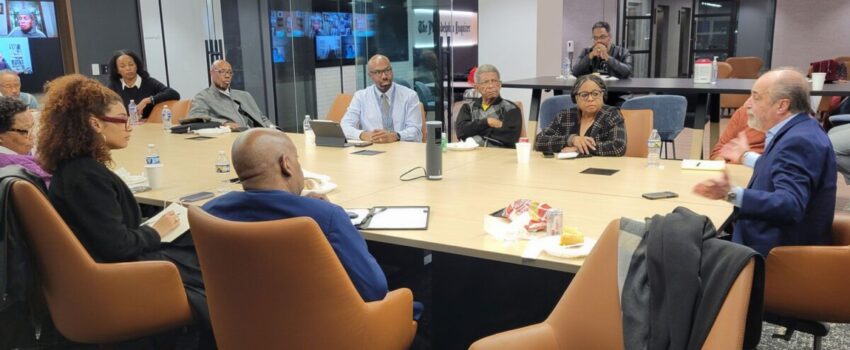
“We have objectives for diversity in hiring,” Editor Gabriel Escobar, right, said, “that we’re graded on.” (Credit: NABJ – Philadelphia)
Despite Cuts, Philly Inquirer Still Commits to DEI
Gabriel Escobar, editor of the Philadelphia Inquirer, wanted to make a few things clear Wednesday night as he met with the Philadelphia members of the National Association of Black Journalists.
First, the Inquirer is not backing down on its commitment to diversity, equity and inclusion, despite the actions of the Trump administration.
Second, the elimination of its Communities and Engagement Desk, the reason for this meeting in the Inquirer building, had been in the works for months as the news organization sought ways to address a declining bottom line amid the changing economics of the news industry. In the 1970s, the paper had 700 journalists. Now it has about 200. “We are at the bare minimum in staffing,” he said.
And third, as innovative as was the idea of reporters getting to know the communities they cover, especially when there was no breaking news, that approach should be adopted by all Inquirer journalists, designated desk for those efforts or not.
The NABJ members wanted to be clear as well.
The Inquirer has a credibility problem among Black and brown people, they said, and moves like elimination of the Communities and Engagement Desk make matters worse.
“There has been an attack on memory, black consciousness and programs, books and peoples that promote black consciousness,” wrote Renaldo McKenzie, doctoral student and founder of The Neoliberal Corporation, a think tank and publishing company, and one of about 47 people attending in person or via Zoom. McKenzie commented in the Zoom chat room.
“In Florida and other states they have banned critical thinking and black academic books. Here in Philly The Inquirer is getting rid of journalists that write about these stories. What assurances will we have that you will continue black thought? black memory? That question has not been answered.”
P. Kenneth Burns, board president of the New Jersey chapter of the Society of Professional Journalists, and Denise Clay-Murray, president and board member of SPJ’s Keystone Pro chapter, each presented statements of concern about eliminating the Communities and Engagement Desk.
Rick Edmonds, writing for the Poynter Institute, quoted from others who were alarmed, such as Sabrina Vourvoulias, who led the unit before being transferred to the opinion section last summer. Vourvoulias wrote on LinkedIn, “I can’t help thinking that the Inquirer has chosen the worst possible moment to deplatform the news desk wholly dedicated to reaching out to and securing the stories of those who will be most impacted. I don’t pretend to be a business person with 20,000 sensible reasons for why this had to happen now; I’m just a storyteller (and the editor of other storytellers) who is mourning what will be lost.”
This is not the first time the Inquirer has confronted racial issues in its newsroom.
In 2021, it launched “More Perfect Union,” described as “a special project from The Inquirer examining the roots of systemic racism in America through institutions founded in Philadelphia.”
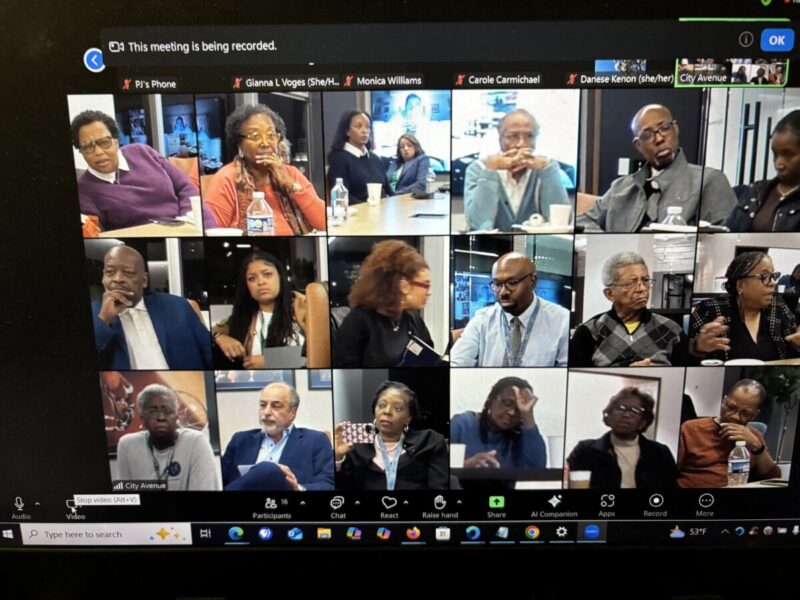
About 48 people participated, some 17 or 18 on Zoom for the 90-minute discussion. (Credit: Richard Prince)
It was written, edited and managed by Black staffers and freelancers. Part of the project examined the Inquirer itself through a racial lens. Today the newsroom staff is 70 to 75 percent white; 24 percent people of color, with 14 percent of those Black.
“We have objectives for diversity in hiring,” Escobar said, “that we’re graded on.” Two of those on the Communities and Engagement Desk who shifted to other staff jobs are eligible for new positions that will be created to expand the paper’s reach — newsletters for readers outside the city limits, for example.
Nevertheless, Clay-Murray said that she wanted to join the opinion section but wasn’t permitted to see the hiring person. Another said the newspaper fails to report the magnitude of the school system’s concerning shortcomings, a contention with which Escobar strongly disagreed.
“A spirit of solidarity permeated last night’s session,” NABJ Philadelphia wrote on social media. “Our frustration and concern were palpable.”
The chapter president, Michael Days, a former Inquirer vice president for diversity and inclusion, suggested the Inquirer do more outreach. “People are angry and this is an opportunity for the Inquirer to be part of the community,” he said.
Despite the complaints, chapter vice president Melanie Burney, who covers K-12 education in New Jersey, said she was proud to work at the Inquirer. “I don’t need a Community and Engagement Desk. I know the community I’m covering,” she told the group.
- Journal-isms: Whose City Gets to Be Called ‘Black’? (March 13, 2022)
- Journal-isms: Whose City Gets to Be Called Black? – Part 2 (scroll down) (April 1, 2023)
- Kiara Santos, Philadelphia Tribune: Inquirer editor addresses recent job cuts before disappointed group of Black journalists
Video shows Tufts graduate student Rümeysa Öztürk being detained by federal immigration authorities on March 25 in Somerville, Mass. (Credit: Boston Globe/YouTube)
Press Groups Blast Arrest of Student Over Op-Ed
Fourteen free speech and journalism organizations released a letter [PDF] Monday condemning the detention of Tufts University student Rümeysa Öztürk reportedly based on opinions she and others expressed in a student newspaper op-ed, the Student Press Law Center, one of the organizations, announced.
“Such a basis for her detention would represent a blatant disregard for the principles of free speech and free press within the First Amendment, and we call on Tufts University officials, Massachusetts lawmakers and federal authorities to take immediate action to secure her release,” the letter states.
The groups include the Student Press Law Center, Freedom of the Press Foundation, PEN America, New England First Amendment Coalition, National Press Photographers Association, Society of Professional Journalists, Associated Collegiate Press, National Scholastic Press Association, Quill and Scroll, College Media Association, Journalism Education Association, New England Scholastic Press Association, Radio Television Digital News Association and the, Foundation for Individual Rights and Expression.
 Anemona Hartocollis wrote Thursday for The New York Times, “Ms. Ozturk (pictured, by Mahsa Khanbabai), a doctoral candidate, was detained on March 25 near her apartment in Somerville, Mass., by federal agents in plain clothes who surrounded her, cuffed her and drove her away in an unmarked S.U.V. Footage of the encounter, captured by a surveillance camera, was viewed by millions of people, and generated outrage that Ms. Ozturk, a Turkish citizen on a student visa, had been picked up off the street even though there were no charges against her.”
Anemona Hartocollis wrote Thursday for The New York Times, “Ms. Ozturk (pictured, by Mahsa Khanbabai), a doctoral candidate, was detained on March 25 near her apartment in Somerville, Mass., by federal agents in plain clothes who surrounded her, cuffed her and drove her away in an unmarked S.U.V. Footage of the encounter, captured by a surveillance camera, was viewed by millions of people, and generated outrage that Ms. Ozturk, a Turkish citizen on a student visa, had been picked up off the street even though there were no charges against her.”
The government was “secretly whisking her away and making sure that no one would know where she was until she was in Louisiana,” said Öztürk’s lawyer, Adriana Lafaille, “adding that she believed the government was ‘forum shopping’ a location for the trial. (Louisiana is home to one of the most conservative appeals courts in the country.) . . .
“Ms. Ozturk is one of many international students whom the Trump administration has threatened to deport, as part of a crackdown on antisemitism at campuses across the country. The secretary of state, Marco Rubio, confirmed that her visa was revoked, saying, ‘We gave you a visa to come and study and get a degree, not to become a social activist that tears up our university campuses.”
‘”The government has not made clear what evidence it has against her. She is included on a website, Canary Mission, run by an anonymous group that says it is dedicated to fighting antisemitism on campus. Pro-Palestinian activists say the group is harassing them. The website links to an opinion essay written by Ms. Ozturk and others and published in the student newspaper, urging Tufts to divest from Israel and citing ‘plausible’ evidence that Israel has committed genocide in Gaza. . . .”
- Associated Press: A look at the people ensnared in Trump’s campaign against pro-Palestinian activism at US colleges
- Bella BaHHS, The Tribe: The Revolutionary Column: Trump will deport Black Americans to overseas prisons, too, if we let him (Feb. 19)
- Rumeysa Ozturk, Fatima Rahman, Genesis Perez and Nicholas Ambeliotis, Tufts Daily: Op-ed: Try again, President Kumar: Renewing calls for Tufts to adopt March 4 TCU Senate resolutions (March 26)
- Student Press Law Center: Student media groups warn of unprecedented threats
- WHDH, Boston: READ: Letter from members of Congress demanding answers on arrest, detention of Rumeysa Ozturk (March 28)

“The tariffs will have a very negative impact on Black-owned newspapers and other Black-owned businesses,” said Benjamin F. Chavis Jr., president and CEO of the National Newspaper Publishers Association, representing more than 230 regional and local Black newspapers. (Credit: Library of Congress)
Black Press Sees Harm in Tariffs on Newsprint
“Black media outlets across the country are preparing for what could be a new era of financial and editorial strain that will put survival to the test in the upcoming years,” Tannistha Sinham wrote Tuesday for the Houston Defender.
“With an ideological backlash against Diversity, Equity and Inclusion (DEI) initiatives that help fund advertising in Black media, publishers are now anticipating a new landscape ahead.
“President Donald Trump is implementing a 25% additional tariff on imports from Canada and Mexico and a 10% additional tariff on imports from China aimed at ‘halting illegal immigration and stopping poisonous fentanyl’ from entering the country. For the Black Press, which imports newsprint and paper, these tariffs could exacerbate the challenges newspapers have faced for years. . . .”
Despite the alarm, the Wisconsin Newspaper Association said Thursday that goods compliant with the United States–Mexico–Canada Agreement, “including newsprint, will continue to be exempt from both the 25% tariffs imposed on goods from Canada and Mexico, and the additional 10% baseline tariff announced April 2.”
However, lumber-specific tariffs are being considered on imports from Canada. the association said.
Three general-interest news industry trade groups — The News/Media Alliance, PRINTING United Alliance, and America’s Newspapers — wrote Tuesday in a letter to Commerce Secretary Howard Lutnick about those lumber-specific tariffs:
“The business reality is that many U.S. publishers must rely upon Canadian paper as a crucial supply component for print newspapers. With newsprint being the second largest expense for small newspapers after human resource costs, any tariffs on Canadian imports of paper will have a devastating impact. “
The Houston Defender quoted Benjamin F. Chavis Jr., president and CEO of the National Newspaper Publishers Association, the Black-press trade group, saying the tariffs “will make it very expensive for our newspapers to stay in business.”
 Sinham wrote that Denise Rolark Barnes (pictured), publisher of the 60 [year-old] Washington Informer, expressed concern about the proposed tariffs’ ripple effects.
Sinham wrote that Denise Rolark Barnes (pictured), publisher of the 60 [year-old] Washington Informer, expressed concern about the proposed tariffs’ ripple effects.
“We’re waiting to hear now whether the cost of newsprint is going to increase,” she said. “what we’ve been told is that our printer has an ample supply of newsprints,…but they’re preparing us for an increase that may come down the road.”
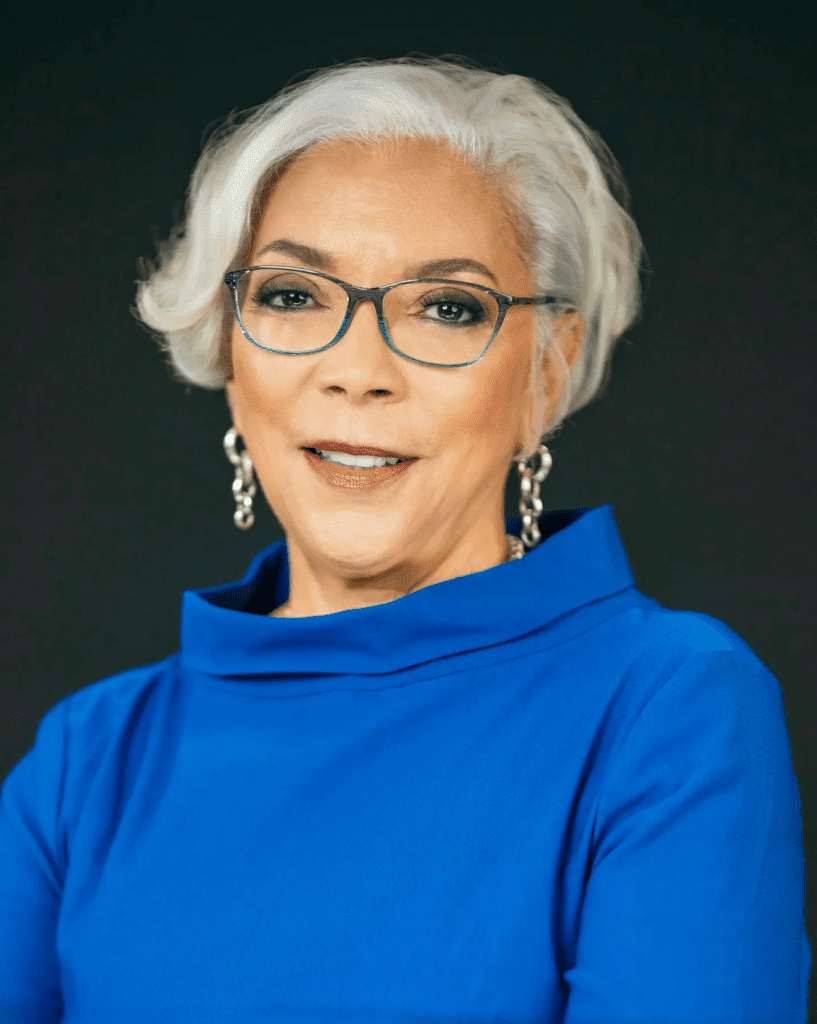 Moreover, “Janis Ware (pictured), publisher of The Atlanta Voice, said adjusting the paper’s overall operational costs can impact editorial decisions.
Moreover, “Janis Ware (pictured), publisher of The Atlanta Voice, said adjusting the paper’s overall operational costs can impact editorial decisions.
‘People don’t realize that the advertising dollars that corporations spend with us come out of a DEI budget,’ she said. ‘They’re pulling back on what they used to do in spending in our publications…folks are nervous about how they’re spending their ad dollars and that entrenchment does impact us.’
She “anticipates adjusting the paper’s overall operational costs to afford printing and distributing costs or slashing the number of pages. . . .”
(Credit: YouTube)
He Wants to Make Sports Journalism ‘Fun Again’
“Joon Lee was caught up in the ESPN layoffs in June 2023,” Tom Jones wrote Thursday for the Poynter Instiute. “He is now returning with his own thing. Here’s his announcement on YouTube.
“He called sports media ‘broken’ and said, ‘For decades, it felt like sports were always about more than who won, who lost and the box score. Sports were a place to tell stories about underdogs and dynasties and heartbreak and redemption. And it feels like, at least right now, the entire industry has lost sight of that.’ He added, ‘I believe we can make sports media fun again. I can’t do this alone — I mean, I don’t want to do it alone. So if you are tired of all the noise, if you miss feeling connected to sports, join me.’
“I’m not sure I totally agree with his assessment that sports media is broken and no fun is being had, but I look forward to seeing what Lee has in store.”
Short Takes
- “The U.S. Naval Academy has removed nearly 400 books from its library after being told by Defense Secretary Pete Hegseth’s office to review and get rid of ones that promote diversity, equity and inclusion, U.S officials said Tuesday,” Lolita C. Baldor reported for the Associated Press. “Academy officials were told to review the library late last week, and an initial search had identified about 900 books for a closer look. They decided on nearly 400 to remove and began doing so Monday, finishing before Hegseth arrived for a visit Tuesday that had already been planned and was not connected to the library purge, officials said.” A list of the books has not yet been made available, the Washington Post reported Thursday.
- “The Trump administration has threatened to withhold federal funds from public schools that have diversity, equity and inclusion programs,” Jonaki Mehta reported Thursday for NPR. “In a letter to state leaders across the country, the U.S. Education Department said Title I funding, which is targeted to schools with a high proportion of low income students, would be threatened if schools failed to follow its interpretation of civil rights laws. . . .”

Maurice DuBois, left, and John Dickerson. (Credit: DeGail Schulman/CBS News)
- “For now, at least, people aren’t racing to watch” the newest version of the “CBS Evening News,” with anchors John Dickerson and Maurice DuBois,” Brian Steinberg reported Wednesday for Variety. “What buoys most of the people involved in ‘Evening News’ is the fact that they are producing a show that has more of the things viewers and journalism aficionados say they want, and less of what they don’t. Staffers privately say they like the additional time their stories get on camera, and they get on screen. There is a heightened emphasis on in-depth reporting, more correspondents on the ground in places other than New York, Washington D.C. and Los Angeles, and more attention paid to the effects of White House policies on blue-collar workers. There are no ‘breaking news’ chyrons in the lower third of the screen, and fewer pivots to tell viewers about stuff that’s popping off the new wires while the show is already in progress. ‘We might do some breaking news, but it has to rise to a certain level,’ says DuBois.
 “MSNBC has chosen longtime political analyst Elise Jordan and veteran political correspondent Antonia Hylton (pictured, Hylton is at left; Jordan at right) to fill the two remaining co-host seats on its upcoming ‘The Weekend: Primetime,’ TheWrap can exclusively reveal,” Sean Burch reported Tuesday for The Wrap. “Te pair’s selection came as new MSNBC President Rebecca Kutler is continuing to revamp the cable channel’s lineup after being named boss in February. Hylton and Jordan will join longtime MSNBC anchor Ayman Mohyeldin and Washington Post columnist Catherine Rampell as the four co-hosts of the show, which is launching in May. ‘The Weekend: Primetime’ will air from 6:00 p.m. to 9:00 p.m. ET on Saturdays and Sundays and be broadcast from New York City.
“MSNBC has chosen longtime political analyst Elise Jordan and veteran political correspondent Antonia Hylton (pictured, Hylton is at left; Jordan at right) to fill the two remaining co-host seats on its upcoming ‘The Weekend: Primetime,’ TheWrap can exclusively reveal,” Sean Burch reported Tuesday for The Wrap. “Te pair’s selection came as new MSNBC President Rebecca Kutler is continuing to revamp the cable channel’s lineup after being named boss in February. Hylton and Jordan will join longtime MSNBC anchor Ayman Mohyeldin and Washington Post columnist Catherine Rampell as the four co-hosts of the show, which is launching in May. ‘The Weekend: Primetime’ will air from 6:00 p.m. to 9:00 p.m. ET on Saturdays and Sundays and be broadcast from New York City.

- Jesús Del Toro, Sonny Messiah Jiles and Angela Y. Robinson are among the “Masters of Media,” previously known as “15 Over 50,” Editor & Publisher announced Wednesday. Editor Robin Blinder said the honors go to “those individuals — aged 50 or older — making a significant impact in their organizations and the industry.” Del Toro is director, La Raza and LaRaza.com and director of grants development, Impremedia, both located in Chicago; Jiles is CEO, Houston Defender Network, Houston; and Robinson is director of operations, National Association of Black Journalists.
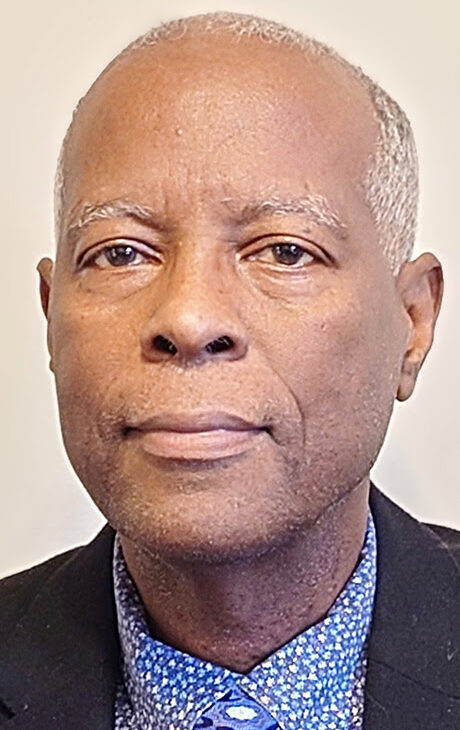 Jube Shiver Jr. (pictured), a Syracuse University alumnus and former journalist at the Los Angeles Times, USA Today, Washington Post and Washington Star, has established a fund to support educational experiences for Newhouse School journalism students such as travel to work on reporting projects or attend conferences, and costs related to internships, the school announced. The Virginia-based Mildred and Jube Foundation Inc. is named after Shiver’s parents. Shiver said the foundation sought to provide support to students at a time when many families are grappling with how to pay for college.
Jube Shiver Jr. (pictured), a Syracuse University alumnus and former journalist at the Los Angeles Times, USA Today, Washington Post and Washington Star, has established a fund to support educational experiences for Newhouse School journalism students such as travel to work on reporting projects or attend conferences, and costs related to internships, the school announced. The Virginia-based Mildred and Jube Foundation Inc. is named after Shiver’s parents. Shiver said the foundation sought to provide support to students at a time when many families are grappling with how to pay for college.

 “For more than 20 years, ESPN’s Around the Horn has taken its audience into a world of organized chaos five days a week,” BET’s Stephen Knox wrote of the show, which debuted in 2002 and has televised more than 4,900 episodes, with its final edition May 23. From “day one the show also embraced what has seemingly become a dirty word in America of late: diversity. Kevin Blackistone [first episode 1/21/2003], currently a columnist for the Washington Post and professor at the University of Maryland, and still in the rotation of panelists, said that producer Aaron Solomon (pictured) understood the importance of diversity, and it can be traced back to his upbringing. “His father is George Solomon, a longtime sports editor of the Washington Post who had groundbreaking hires during his time there,” Blackistone tells BET. “Having women cover the football team, or having women cover baseball, or having Mike Wilbon become the first Black [sports] columnist at the Washington Post, that’s the stock that Aaron Solomon comes from.”. . .
“For more than 20 years, ESPN’s Around the Horn has taken its audience into a world of organized chaos five days a week,” BET’s Stephen Knox wrote of the show, which debuted in 2002 and has televised more than 4,900 episodes, with its final edition May 23. From “day one the show also embraced what has seemingly become a dirty word in America of late: diversity. Kevin Blackistone [first episode 1/21/2003], currently a columnist for the Washington Post and professor at the University of Maryland, and still in the rotation of panelists, said that producer Aaron Solomon (pictured) understood the importance of diversity, and it can be traced back to his upbringing. “His father is George Solomon, a longtime sports editor of the Washington Post who had groundbreaking hires during his time there,” Blackistone tells BET. “Having women cover the football team, or having women cover baseball, or having Mike Wilbon become the first Black [sports] columnist at the Washington Post, that’s the stock that Aaron Solomon comes from.”. . .
“We had to be better to be equal,” said Becky Livas, the former WTKR (then WTAR) anchor, who was hired in 1972 as the first Black female TV news reporter in the market. https://t.co/79jqD6P5Vi pic.twitter.com/Mq2leawg9A
— WTKR News 3 (@WTKR3) April 3, 2025
(If the image is not visible, please consider viewing on another browser.)
- WTKR-TV in Norfolk, Va., honored its history-making female journalists on 75th anniversary. “Becky Livas is a living legend,” Jessica Larché reported Wednesday for the station. “Becky Livas became the first Black female television news reporter in Hampton Roads when WTAR-TV hired her in 1972. She made history in 1972 when WTAR-TV (now WTKR-TV) hired her as the first Black female television news reporter in Hampton Roads. ‘[Black journalists] had to be better than other people just be [on television],’ said Livas. ‘It was important for us to be journalists.’ . . . .The barriers Becky Livas broke from 1972 to 1980 paved the way for more history-making women at WTKR News 3 – including longtime anchor Barbara Ciara and Barbara Hamm Lee, the first Black female news director in Hampton Roads television.” Ciara, who retired in 2023, was president of the National Association of Black Journalists from 2007 to 2009.
-
 “Candace Buckner (pictured) of The Washington Post won first place in the 2024 Associated Press Sports Editors contest in the Division A Columns category,” the organization announced Friday. Buckner joined the Post in 2016, according to her Post bio. “She has written sports columns and criticism since late 2021. Over her first three years in the role, she has twice earned Top 10 honors in column writing from the Associated Press Sports Editors. Since 2002, Buckner has covered sports at various newspapers, with stops in Macon, Ga.; Kansas City, Mo.; Gary, Ind.; and Vancouver, Wash. and at the Indianapolis Star.”
“Candace Buckner (pictured) of The Washington Post won first place in the 2024 Associated Press Sports Editors contest in the Division A Columns category,” the organization announced Friday. Buckner joined the Post in 2016, according to her Post bio. “She has written sports columns and criticism since late 2021. Over her first three years in the role, she has twice earned Top 10 honors in column writing from the Associated Press Sports Editors. Since 2002, Buckner has covered sports at various newspapers, with stops in Macon, Ga.; Kansas City, Mo.; Gary, Ind.; and Vancouver, Wash. and at the Indianapolis Star.”

- Brian Bull (pictured), who has spent more than 27 years as a public media journalist, is leaving the University of Oregon’s School of Journalism and Communication, where he is an assistant professor, to join Buffalo Fire, a Native American-led North Dakota-based startup led by longtime journalist Jodi Rave Spotted Bear, who is publisher. “I’ll be covering Native/Indigenous communities and events across the PNW [Pacific Northwest], and hopefully using my video and audio skills to expand the organization’s media offerings,” Bull wrote Tuesday on Facebook. “It wasn’t an easy call, my last term ended with some of the strongest praise I’ve received yet as a professor. . . . At the same time, I felt my work-life balance was going askew (very apparent when I was up at 2am grading assignments) and while I enjoyed many aspects of teaching, the pull of going back to reporting in the trenches was inescapable,” added Bull, an enrolled member of the Nez Perce Tribe.
 In Brazil, ‘”Aiming to promote inclusion and racial justice in digital spaces, the Black Journalists Network for Diversity in Communication (Rede JP), in partnership with the Peregum Institute,” has “launched the Best Practices Guide for Anti-Racist Digital Communication,” Agência Brasil reported Thursday. “The initiative is supported by the UNESCO Chair in Communication and other institutions. The publication, available for free in digital format, will be accessible as a PDF on the official website of the Black Journalists Network for Diversity in Communication.”
In Brazil, ‘”Aiming to promote inclusion and racial justice in digital spaces, the Black Journalists Network for Diversity in Communication (Rede JP), in partnership with the Peregum Institute,” has “launched the Best Practices Guide for Anti-Racist Digital Communication,” Agência Brasil reported Thursday. “The initiative is supported by the UNESCO Chair in Communication and other institutions. The publication, available for free in digital format, will be accessible as a PDF on the official website of the Black Journalists Network for Diversity in Communication.”

War damage to the headquarters of the Sudan News Agency (SUNA) in Khartoum (Credit: SUNA)
- “As the Sudanese Armed Forces have slowly regained control over much of Khartoum over the past days, reports are confirming that at least 90 per cent of media, including TV, radio, and newspaper facilities have been completely destroyed during the hostilities, while looters have stripped any usable equipment and assets in the city that has always been Sudan’s main media hub,” Dabanga, which operates from exile, reported Sunday. The United Nations has declared the war in Sudan the world’s worst humanitarian crisis.
- “At least 43 journalists in Ethiopia were arrested, imprisoned, or kidnapped in 2024, according to the Journalists’ Safety Assessment Report by International Media Support (IMS), which states that the safety of journalists has been ‘increasingly threatened,’ with journalists facing intimidation, detention, and harassment from both state and non-state actors, the Addis Standard reported Wednesday. “The assessment, based on interviews with 60 journalists and documented cases, found that those in conflict-affected areas faced particular risks, especially in Amhara, Oromia, and Benishangul-Gumuz. . . .”
- The Committee to Protect Journalists called on authorities in Burkina Faso Friday “to release recently detained journalists Guézouma Sanogo, Boukari Ouoba, and Luc Pagbelguem after they appeared in military uniform in videos posted on social media. The video showing the three “reinforces the fears about the fate of the seven journalists kidnapped since June 2024, six of whom are now certain to have been forcibly conscripted into the army,” said Moussa Ngom, CPJ’s Francophone Africa representative. “Authorities must stop their efforts to censor the press by forcing journalists into military service and allow them to return to their homes and work. ”
[btnsx id=”5768″]
To subscribe at no cost, please send an email to journal-isms+subscribe@groups.io and say who you are.
Facebook users: “Like” “Richard Prince’s Journal-isms” on Facebook.
Follow Richard Prince on Twitter @princeeditor
Richard Prince’s Journal-isms originates from Washington. It began in print before most of us knew what the internet was, and it would like to be referred to as a “column.” Any views expressed in the column are those of the person or organization quoted and not those of any other entity. Send tips, comments and concerns to Richard Prince at journal-isms+owner@

